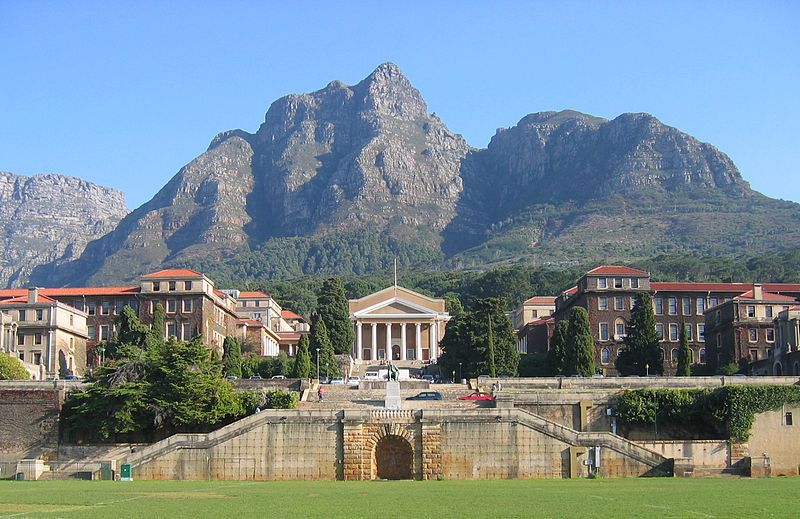The ongoing protest action by the University of Cape Town students to remove a statue of colonial-era industrialist and mining magnate Cecil John Rhodes from the varsity’s grounds has galvanized a large body of the student population, and even sparked a large and growing social media campaign.
Students on campus have been visibly protesting almost every day, holding talks and dialogues and actively engaging with UCT authorities, management and activist groups.
“I didn’t know what the students were going on about until they had the talk in Jammie Plaza,” said Noluthando Xaba *, describing the dialogue that took place last week in which students, staff and others gave their input for and against the removal of the statue.
She believes now that many students on campus are unaware of the various colonial symbols that are still present at the campus.
“We should read up more on what these things mean, we know other places they change street names because they represent Apartheid or other things from the past but even at varsity we don’t know what half the places’ names mean.”
On Tuesday the university’s Rector Max Price gave his view on the matter after being abroad while the main shock of the initial protests, which involved excrement being thrown on the statue, took place. While calling for an active dialogue on the matter, in a statement Price said he agrees that the statue is a reminder of the university’s colonial heritage, and should be moved from the prominent position it takes up on the grounds.
“I have previously stated that the Rhodes statue is indeed a symbol of UCT’s colonial past. Many have noted that as it currently stands, the statue of Rhodes is unmediated by any critical commentary or historical contextualisation. There is nothing to suggest to any passer-by how the university situates itself in relation to Rhodes’ actions and their impact. At the very least, we need to engage with that.”
Price said the statue’s location and position suggest the university takes pride in Rhodes’s deeds as a colonialist and an evidenced oppressor across Southern Africa.
“It is because the brooding presence of Cecil John Rhodes is located in pride of place, at the focal point of the campus, that it acquires the connotations of founder, hero, patron, role model, and embodiment of UCT’s heritage. I do not think the statue should be destroyed or hidden away. I just think it should not be there – it should be moved,” Price said.
He called on the Student Representative Council, who are spearheading the movement, and its supporters to engage with the institution. But Roscoe Jacobs, a student activist, says the SRC’s refusal to engage is as a result of promises broken by management in the past on issues of transformation.
“It comes as a result of past SRCs doing precisely what the vice-chancellor and management wanted them to do, and that was to engage; a letter was sent out by nine past SRC presidents saying that this is not something new, it’s been coming on for a long time. I think the stance of the SRC is one of debating the issue for far too long and we as students want a decision to be made.”
Jacobs believes that because the outcry comes from non white students, the fight to remove the statue will be much tougher than for others. He believes white students on campus are still privileged.
“A few days ago someone vandalized a memorial on campus and it was allowed to be removed in a flash by those who found it offensive, so on the other side of what we stand for it’s easier to get things done. We as black students, when we find something offensive we also want the same reaction and response from the institution as for others,” he explained.
By Thursday, the Facebook page ‘UCT: Rhodes Must Fall’ had garnered nearly 3700 followers, the hashtags ‘#RhodesMustFall’ and ‘#RhodesSoWhite’ were trending across the country and had been picked up as far afield as Qatar via its Al Jazeera network picking up on the story.
The issue has raised debate among various social commentators and received the support of political parties that in other circumstance are seen as adversaries: the Economic Freedom Fighters last week expressed its support for the movement as well as the African National Congress Youth League, whose Western Cape chairperson Mohamed Sayed spoke at the above mentioned dialogue. VOC (Andriques Che Petersen)






 WhatsApp us
WhatsApp us 


3 comments
Mandela somehow found Cecil John Rhodes, an arch-imperialist, to be a worthy collaborator in his vision for post-Apartheid South Africa. This is not the first time that Mandela sold out to power and followed the money. Those of us who have been critical of Mandela were dismissed as unnecessarily awkward.
Miqdad I have no idea what you're referring to, Mandela had nothing to do with Rhodes or approved of him. This article is about an invigorating movement taking place, it's not the time to divert from the issue and nitpick at our past leaders, as flawed as they may be.
Miqdad I have no idea what you're referring to, Mandela had nothing to do with Rhodes or approved of him. This article is about an invigorating movement taking place, it's not the time to divert from the issue and nitpick at our past leaders, as flawed as they may be.